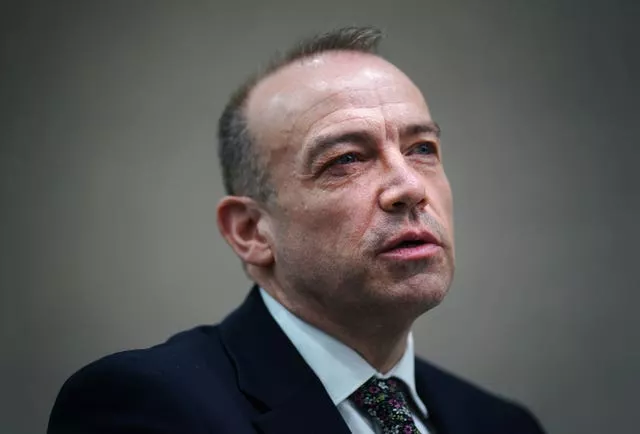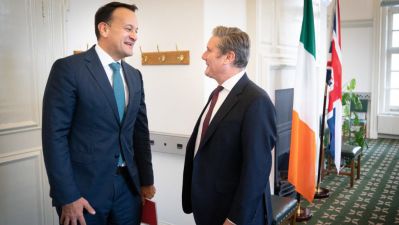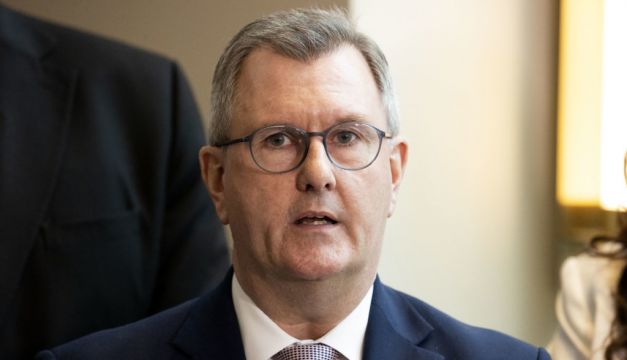Calling another Stormont election will not bring a resolution to the Northern Ireland Protocol dispute any closer, the leader of the DUP has said.
Jeffrey Donaldson said his party was ready to fight an election if the British government calls one when a legislative deadline for forming a powersharing executive at Stormont lapses on Friday.
The DUP has refused to engage with the devolved institutions in Belfast in the wake of May’s Assembly election, meaning it has not been possible to form a ministerial executive.
The party’s boycott is part of its campaign of opposition to the post-Brexit trading arrangements and it says it will not return to powersharing until decisive action is taken to remove the protocol’s rules on trade between Britain and Northern Ireland.

A six-month legislative deadline to form an administration expires on Friday. If no executive is in place by that date, the Government assumes a legal responsibility to call another election.
Northern Ireland Secretary Chris Heaton-Harris has made it clear he will call a fresh poll if the deadline passes, with December 15 the likely date.
However, it remains unclear whether new UK prime minister Rishi Sunak will take a different approach to the issue, and if Mr Heaton-Harris will even still be in his job come Friday.
The UK government has vowed to secure changes to the protocol, either by a negotiated compromise with the EU or through proposed domestic legislation – the Northern Ireland Protocol Bill – which would empower ministers to scrap the arrangements without the approval of Brussels.
The European Commission has warned that such unilateral action at Westminster would be in breach of international law and could prompt retaliatory action.
Talks with the EU resumed recently, with both London and Brussels talking up the potential of reaching an agreed solution.
Mr Donaldson said the decision on whether to call an election was a matter solely for the Government to determine.
“If they call an election on Friday, we will be ready,” he told BBC Radio Ulster.
“We will take our case to the country. We will seek to refresh our mandate because we want to get this protocol sorted out once and for all.
“As it happens, I don’t believe an election will take us any closer to that. I don’t think an election will hasten the day when the protocol is sorted out.
“But it is a matter for the government to take that decision and whatever happens we will be ready.”

The oversight role of the European Court of Justice (ECJ) in the protocol is one of the main sticking points in the stand-off between the EU and UK.
Mr Donaldson said: “Whether it’s by legislation or negotiation, we want to see a solution that restores Northern Ireland’s place within the UK internal market and removes the barriers to trade created by the protocol.
“It is the policy of the Conservative government that they deal with the European Court of Justice issue in the context of any negotiation.
“So, we expect that would be part of the outcome that there would be agreement in the future because, of course, the issue at the heart of this is that Northern Ireland is subject to laws that are imposed by the European Union and over which we have no say, and that is, in essence, the democratic deficit here, and that needs to be dealt with and, of course, the ECJ is part of that.
“But the key issue is if Northern Ireland is to be fully within the United Kingdom internal market, then we cannot be subject to EU laws to regulate how we trade within that market.

“Of course we have to comply with EU rules if we’re exporting goods to the European Union. But that doesn’t mean barriers to trade in the Irish Sea. And that’s what we strongly object to.”
Alliance Party leader Naomi Long expressed hope that Mr Sunak would view finding a resolution to the powersharing vacuum in Northern Ireland as a priority issue.
“Given that the Northern Ireland crisis is now inextricably linked to the protocol and getting resolution and a good relationship with Europe, which Rishi Sunak has said we should have, and that it’s also linked to the ability to be able to get a deal with the US in terms of trade, it might by consequence of that be dealt with as a slight, slightly higher priority,” she told Radio Ulster.







